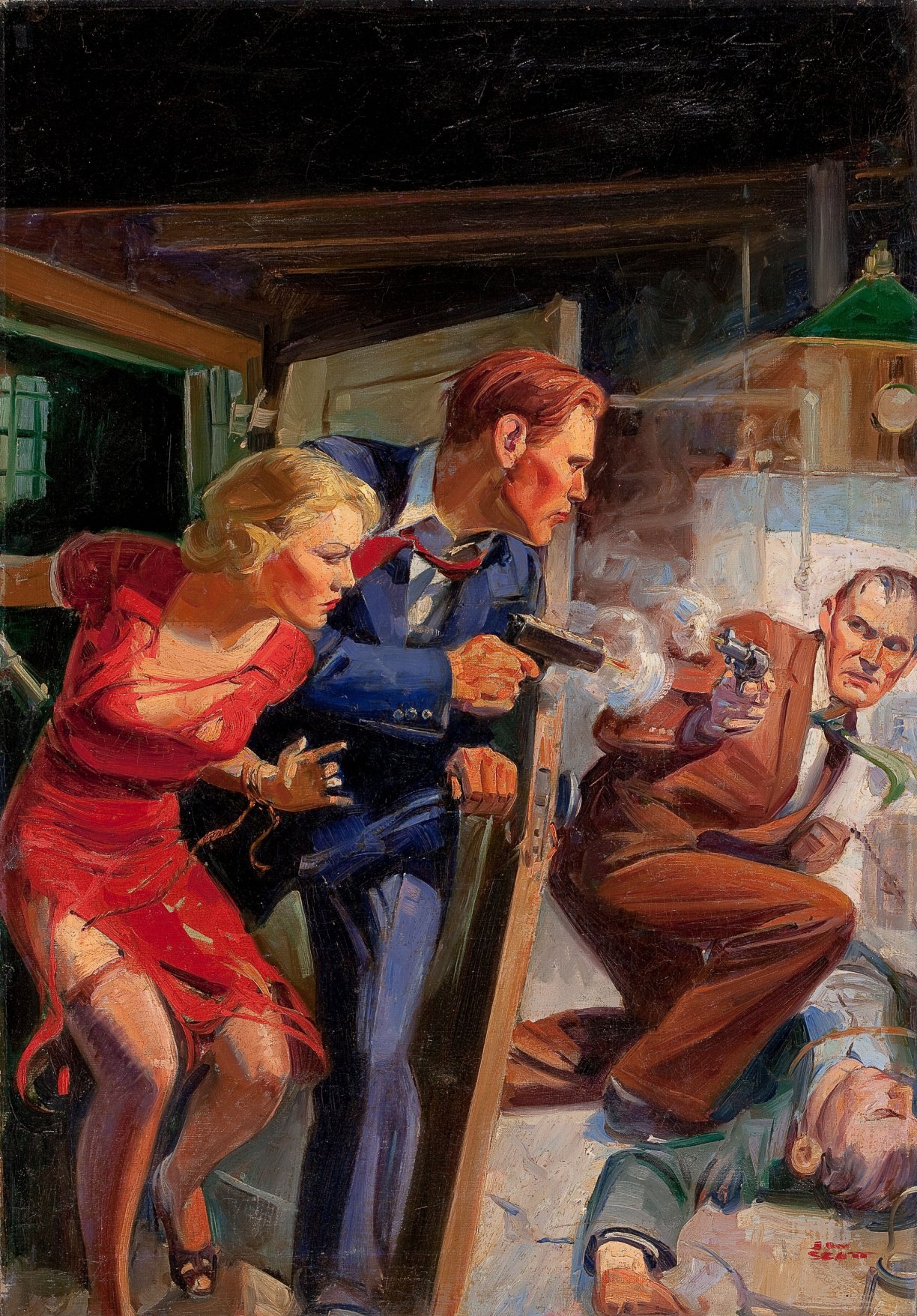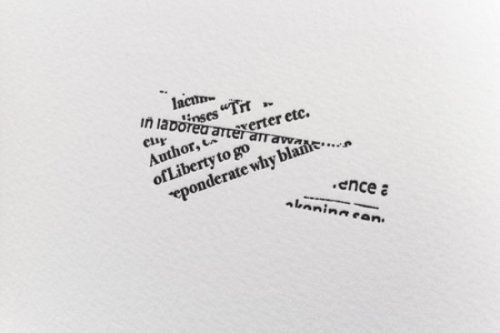Crime and art have always been closely intertwined but it is the prerogative of today’s connoisseur to pass by the elements that link violence and disorder with creation for a somewhat more wholesome view of an art in alliance with social progress or more cynically– one could say– as a lubricant for capital. The Mad and The Bad features readings of recent translations of important historic crime novels, poetry, and political writing, as well as contemporary pulp genre experiments that celebrate all forms of deviation, criminality and antisocial sentiments. With David Georgi, James Hoff, Jason Napoli-Brooks, Luc Sante, and Donald Nicholson-Smith.
James Hoff: How the Box Found the Hat and the Chair Floored the Table
Written in 2003, How the Box Found the Hat and the Chair Floored the Table is novel that trails a young kid named Francis as he attempts to find an elder hobo named Mens Higgins– ultimately finding answers through clues left in Hollywood Babylon. A stubbed noise meditation on drifting through New York City at a young age minus the drugs, drink and prostitution that traditionally plagues that coming-of-age genre.
James Hoff is an artist living and working in Brooklyn, NY. His work encompasses painting, sound, writing, performance, and publishing among other media. He has maintained a strong focus on distributed forms and experiments with language, including cross-disciplinary investigations that address orally-transmitted syndromes, computer viruses, and ear worms. Hoff has just released a new record with PAN titled BLASTER. He is also a co-founder with Miriam Katzeff of Primary Information, a non-profit arts organization devoted to publishing artists’ books and art historical documents.
Jason Napoli Brooks: Cock of the Walk
Cock of the Walk is a spy serial that follows the mishaps the Cock, an everyday man who dies and is reanimated as a special agent for a shadowy syndicate of leftists. The story unfolds through a series of spliced monologues from the Cock, who is an amnesiac and sex addict; the Calico, a female assassin trained in Vipassana yoga; and the Voice, the mysterious founder of the syndicate. There is also a talking Pierre Cardin suit, an eight foot macaw, mystic zebras, as well flashbacks to the Jonestown massacre and the MOVE bombing in Philadelphia. Published on a regular basis from 2011 to 2013, Cock of the Walk is about to enjoy an anticipated reboot. The serial is available only in hard-copy and has garnered a long mailing list in both the U.S. and abroad.
Jason Napoli Brooks is a fiction writer and playwright. His fiction and non-fiction have appeared in various publications. His plays have been performed in New York, Madrid, Berlin, and Philadelphia. He lives in New York City.
David Georgi reads François Villon
This selection hits some of the most overtly crime-related moments in Villon's poetry -- but gallows humor, biting social satire, and a smirking irreverence toward authority are not hard to find in the work of this once-promising Sorbonne graduate who instead went on to burgle the theology college, knife a priest, dodge a death sentence, and sample the hospitality of various jails and dungeons.
David Georgi got his Ph.D. in comparative literature at N.Y.U. and now works at Vanity Fair magazine, where he is the only medieval specialist in the building.
Luc Sante reads Georges Darien
Georges Darien (Georges Hippolyte Adrien, 1862-1921) was a mysterious, funny, and angry French novelist, somewhere between Alfred Jarry and Mark Twain (he is also almost entirely untranslated). Bas les coeurs! (Lower Your Hearts; 1889) is a bitterly farcical recounting of the events of the Paris Commune from the perspective of the bourgeois refugees in Versailles; Biribi (1890) a blistering exposé of the “disciplinary battalions” in the French army; Les Pharisiens (1891) an attack on antisemitism, years before the Dreyfus affair. His best-known work, Le Voleur (The Thief; 1897), from which Sante reads this evening, was reissued under André Breton’s imprimatur in 1955, leading to Darien’s rediscovery, and filmed (unconvincingly) by Louis Malle in 1967. Calmly and as it were socratically it establishes theft as a reasonable career path and moral choice for the unprivileged in capitalist society. “[The thief is] the ultimate representative, corrupted if you must, of the individual conscience.” So little is known of Darien’s life — and virtually nothing about the six years preceding its publication — that it has been thought to be autobiographical, that Darien himself must have been an international jewel thief and burglar. He contributed to many anarchist periodicals, although refusing to submit to any political description, and twice unsuccessfully ran for office as a Single Tax candidate.
Luc Sante's books include Low Life, Evidence, The Factory of Facts, and Kill All Your Darlings. Next fall Farrar Straus & Giroux will publish The Other Paris: The People's City, Nineteenth and Twentieth Centuries. He has also translated Félix Fénéon’s Novels in Three Lines. He is a frequent contributor to The New York Review of Books and teaches writing and the history of photography at Bard College.
Donald Nicholson-Smith reads Jean-Patrick Manchette
Michel Hartog, a sometime architect, is a powerful businessman and famous philanthropist whose immense fortune has just grown that much greater following the death of his brother in an accident. Peter is his orphaned nephew—a spoiled brat. Julie is in an insane asylum. Thompson is a hired gunman with a serious ulcer. Michel hires Julie to look after Peter. And he hires Thompson to kill them. Julie and Peter escape. Thompson pursues. Bullets fly. Bodies accumulate. The craziness is just getting started. Like Jean-Patrick Manchette’s celebrated Fatale, The Mad and the Bad is a clear-eyed, cold-blooded, pitch-perfect work of creative destruction.
Donald Nicholson-Smith’s translations of noir fiction include Manchette’s Three to Kill; Thierry Jonquet’s Mygale (a.k.a. Tarantula); and (with Alyson Waters) Yasmina Khadra’s Cousin K. He has also translated works by Paco Ignacio Taibo II, Henri Lefebvre, Raoul Vaneigem, Antonin Artaud, Jean Laplanche, Guillaume Apollinaire, and Guy Debord. For NYRB Classics he has translated Manchette’s Fatale and is presently working on Jean-Paul Clébert’s Paris Insolite. Born in Manchester, England, he is a longtime resident of New York City.





